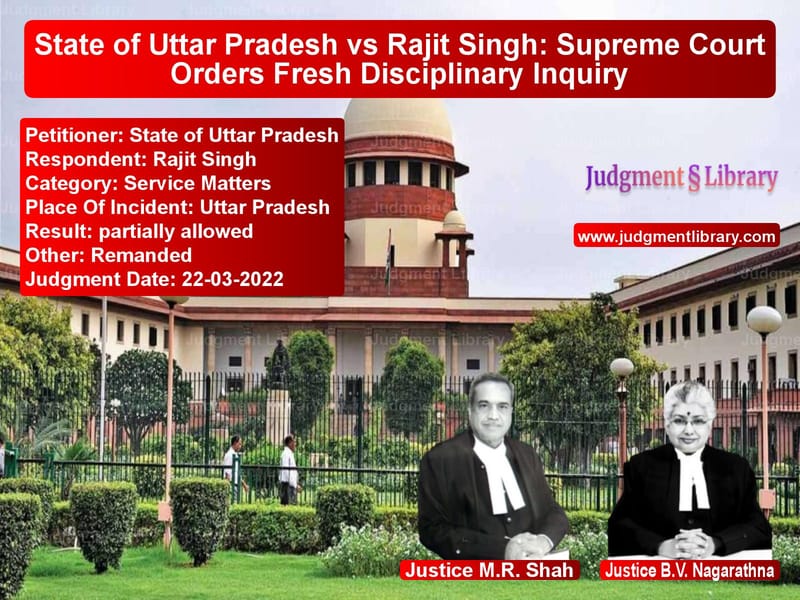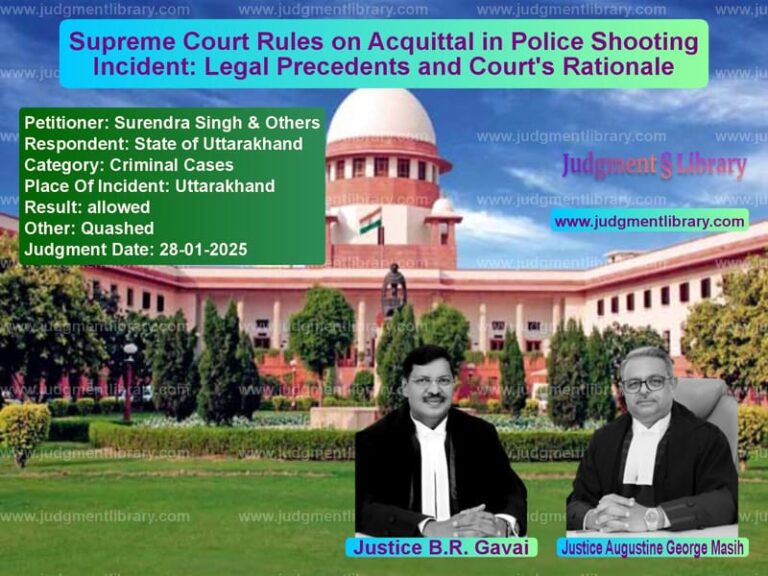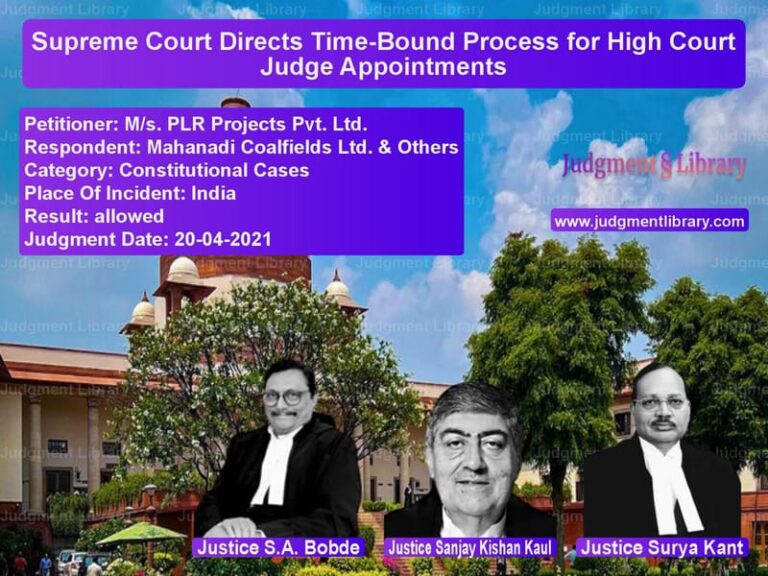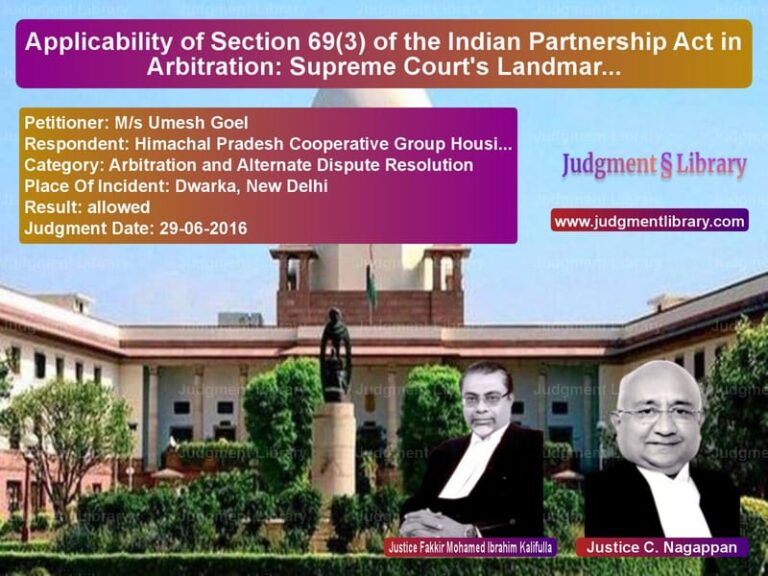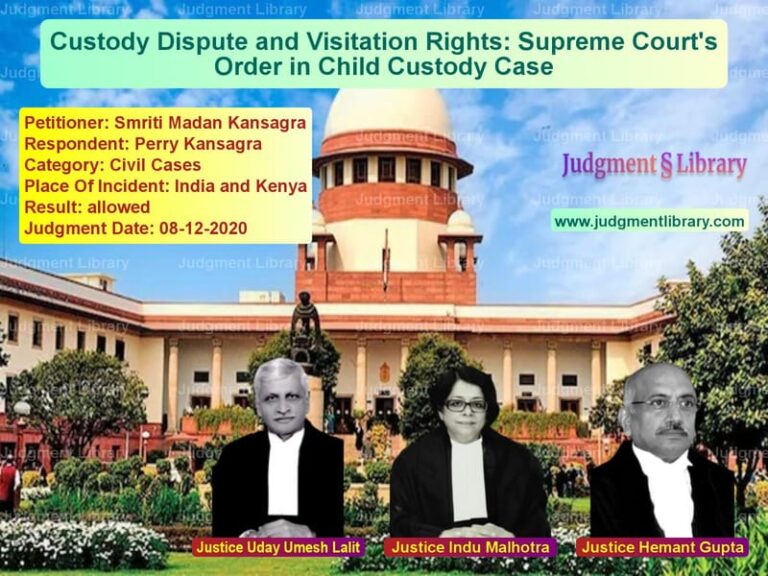State of Uttar Pradesh vs Rajit Singh: Supreme Court Orders Fresh Disciplinary Inquiry
The Supreme Court of India, in its judgment dated March 22, 2022, ruled on the case of The State of Uttar Pradesh & Others vs Rajit Singh, setting aside the High Court’s order that quashed the punishment imposed on a government employee accused of financial irregularities. Instead of exonerating the employee, the Supreme Court directed the Disciplinary Authority to conduct a fresh inquiry from the stage where it was found vitiated due to procedural lapses.
The dispute originated when the Uttar Pradesh government penalized the respondent, Rajit Singh, a Junior Engineer, after an internal inquiry found him guilty of misconduct that led to a monetary loss of Rs. 22,48,964.42 to the state. However, the punishment was challenged before the U.P. State Public Service Tribunal, which overturned the disciplinary order, citing procedural irregularities and the principle of equality, as other officers involved in the same incident were exonerated.
Background of the Case
The respondent was working as a Junior Engineer in the state’s Public Works Department. A departmental inquiry found him responsible for financial losses due to alleged irregularities in execution of work. Based on the inquiry, the state imposed the following punishments:
- Recovery of Rs. 22,48,964.42 from his salary.
- Temporary stoppage of two salary increments.
- Adverse remarks in his service records for the year 2017-2018.
Challenging this punishment, the respondent first approached the U.P. State Public Service Tribunal, which ruled in his favor, setting aside the penalty primarily on two grounds:
- The disciplinary inquiry violated principles of natural justice as the relevant documents were not provided to the employee.
- The principle of equality (Doctrine of Equality) applied, as other officers involved in the same case were not punished.
The state challenged the Tribunal’s decision before the Allahabad High Court, but the High Court upheld the Tribunal’s ruling. Dissatisfied with the decision, the state government appealed to the Supreme Court.
Petitioner’s Arguments (State of Uttar Pradesh)
The state government, represented by Senior Advocate V.K. Shukla, presented the following arguments:
- The disciplinary proceedings were conducted fairly, and the employee was given adequate opportunity to defend himself.
- The employee was guilty of financial irregularities, and the penalty was justified.
- Even if there were procedural lapses, the Tribunal should have remanded the case for a fresh inquiry rather than quashing the penalty.
- Other employees may have been exonerated, but each case must be assessed individually. The doctrine of equality should not apply to disciplinary matters.
Respondent’s Arguments (Rajit Singh)
The respondent, represented by Advocate Utkarsh Srivastava, countered:
- The disciplinary inquiry was flawed as crucial documents were not provided to the employee.
- Since other engineers involved in the same issue were exonerated, it was unfair to single out the respondent for punishment.
- The High Court rightly upheld the Tribunal’s ruling, ensuring fairness in the disciplinary process.
Supreme Court’s Observations
The Supreme Court, comprising Justices M.R. Shah and B.V. Nagarathna, examined the case in detail and made the following observations:
On the Doctrine of Equality
The Supreme Court held:
“The Doctrine of Equality ought not to have been applied when the Enquiry Officer and the Disciplinary Authority held the charges proved against the delinquent officer. The role of each individual officer, even with respect to the same misconduct, must be considered separately.”
On the Violation of Natural Justice
The Court acknowledged that relevant documents were not provided to the employee, which rendered the inquiry procedurally defective. However, rather than exonerating the respondent, the Court ruled that the correct remedy was to remand the case for a fresh inquiry.
The Court cited the judgment in Chairman, Life Insurance Corporation of India & Others vs. A. Masilamani (2013) 6 SCC 530, emphasizing that:
“Once the Court sets aside an order of punishment on the ground that the inquiry was not properly conducted, it cannot reinstate the employee but must remit the case to the Disciplinary Authority for a fresh inquiry.”
Final Verdict
The Supreme Court ruled:
“The findings recorded by the Tribunal as well as the High Court quashing and setting aside the order of punishment imposed by the Disciplinary Authority by applying the Doctrine of Equality is hereby quashed and set aside. However, as the enquiry is found to be vitiated and in violation of the principles of natural justice, we remand the matter to the Disciplinary Authority to conduct a fresh enquiry from the stage it stood vitiated.”
Implications of the Judgment
This ruling sets significant legal precedents:
- Courts should not apply the Doctrine of Equality in disciplinary proceedings involving different levels of involvement in misconduct.
- Procedural lapses in a disciplinary inquiry should be corrected through a fresh inquiry rather than complete exoneration.
- State governments must ensure procedural fairness in disciplinary actions but are not required to treat all employees identically.
Conclusion
The Supreme Court’s ruling in State of Uttar Pradesh vs Rajit Singh underscores the importance of fair disciplinary inquiries and adherence to natural justice. While setting aside the High Court’s order that had entirely quashed the penalty, the Court struck a balance by allowing a fresh inquiry, ensuring that the respondent gets a fair chance to defend himself while also allowing the state to recover the financial loss if found guilty.
By reinforcing the distinction between procedural fairness and substantive misconduct, this judgment provides valuable guidance on handling disciplinary cases in government employment.
Petitioner Name: State of Uttar Pradesh.Respondent Name: Rajit Singh.Judgment By: Justice M.R. Shah, Justice B.V. Nagarathna.Place Of Incident: Uttar Pradesh.Judgment Date: 22-03-2022.
Don’t miss out on the full details! Download the complete judgment in PDF format below and gain valuable insights instantly!
Download Judgment: state-of-uttar-prade-vs-rajit-singh-supreme-court-of-india-judgment-dated-22-03-2022.pdf
Directly Download Judgment: Directly download this Judgment
See all petitions in Disciplinary Proceedings
See all petitions in Public Sector Employees
See all petitions in Termination Cases
See all petitions in Judgment by Mukeshkumar Rasikbhai Shah
See all petitions in Judgment by B.V. Nagarathna
See all petitions in partially allowed
See all petitions in Remanded
See all petitions in supreme court of India judgments March 2022
See all petitions in 2022 judgments
See all posts in Service Matters Category
See all allowed petitions in Service Matters Category
See all Dismissed petitions in Service Matters Category
See all partially allowed petitions in Service Matters Category

